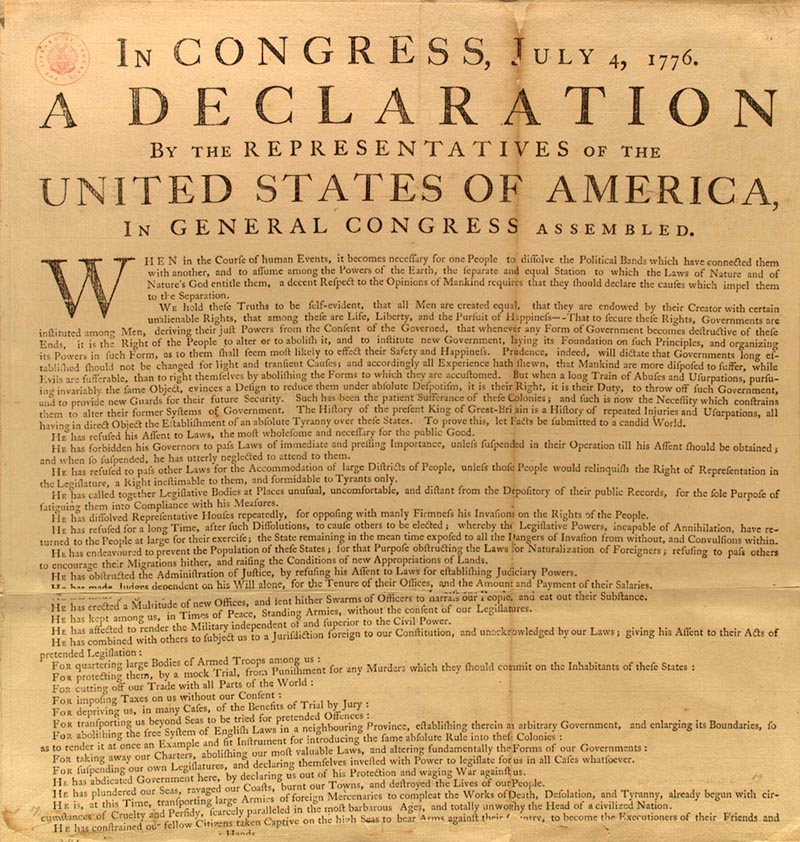Just in time for America’s Independence Day holiday, Rasmussen has released its analysis of a poll examining the attitudes of Americans regarding the ideals expressed in the Declaration of Independence.
The Declaration of Independence is one of the two crucial founding documents of the US – the other, of course, being the Constitution. The Constitution is the technical document outlining the structure and powers of the national  government. The Declaration establishes the rational foundation for the very existence of this country.
government. The Declaration establishes the rational foundation for the very existence of this country.
Rasmussen’s strategy – and I’m not sure that this was the best idea – was to take various famous phrases from the document, and ask: “Do you agree with this?” The answers were recorded without any sure knowledge of what the respondent thought the phrase meant.
The response that jumped out to me was the one asking respondents’ opinion of this part of the Declaration:
That to secure these rights, governments are instituted among men, deriving their just powers from the consent of the governed.
The pollsters shortened this to “Governments derive their only just powers from the consent of the governed”. This paraphrase actually skirts around Jefferson’s profound assertion that the purpose of government is to secure the God-given rights of the people. But that’s the subject of another post, another time. The paraphrase was fair enough, because it adequately portrayed the other profound assertion in this statement.
So, what did the respondents think of the paraphrase?
56% Agree
25% Disagree
19% Not sure
Modern America has a shallow understanding of the phrase “consent of the governed”. Does it mean that, as long as most of the people are okay with it, the government can do whatever it pleases?
I would argue that this is what most people believe. In fact, this is the very essence of democracy: the will of the people legitimizes the actions of the government.
But America was not established as a democracy. It was established as a constitutional republic. In a constitutional republic, there are boundaries to the “consent of the governed”.
Under our Constitution, the government is supposed to be constrained, regardless of the will of the people. Just because a majority of the people consent to (or even demand) some action of the government, such consent does not necessarily legitimize the action.
The many unconstitutional actions of the Obama administration, done to wide acclaim, should serve to abundantly illustrate the problem. President Obama does not recognize any meaningful boundaries on his powers to transform America in his image.
What about the 25% who disagree? I wish that Rasmussen could have asked some followup questions to find out what these respondents were thinking. For example, some might have been thinking of the biblical notion (found, for example, in Romans 13:1) that governments derive their just powers from God Himself. We’ll never know for sure if this is why they disagreed.
As for the 19%… who are these people? 1 in 5 people have no idea what makes a government legitimate? Are these the fabled “moderate” voters, who refuse to be pinned down on the important issues of the day?
Whatever. I wish more people would put more thought into what constitutes legitimate government, and that they would follow their reasoning through to its logical conclusion.
Despite the responses to this and other questions in the poll, I disagree with Rasmussen’s conclusion that Americans “still embrace ideals from the Declaration of Independence”.
How can they embrace what they do not comprehend?
1 comment:
Key Concepts not taught in US Schools:
1) Constitutional - A system based on a written document defining the relationship of a government to its people. The US Constitution and particularly the First 10 Amendments fence off certain area of life from the Government.
2) Republic - from a Latin phrase res publica meaning public thing. Requires that our government be transparent and reviewable by the citizens. Resources for the public minded citizen include Thomas.loc.gov which provides access to the proceedings and activities of Congress. Our judicial system is also publicly available through the web including current Supreme Court Decisions http://www.scotuswiki.com/index.php?title=Ricci%2C_et_al._v._DeStefano%2C_et_al.
(note - this site is run by a law firm practicing before the Supreme Court)The various executive branch agencies (Defense, Commerce, Treasury, etc. also have web presence, http://www.usa.gov/ is a useful portal into the various departments and agencies (Note: usa.gov is a government information resource, created maintained and run by people with an interest in maintaining the status quo and as such should not be regarded as definitive.)
The informed citizen uses all tools available and pracices the principle of caveat emptor buyer beware.
Post a Comment